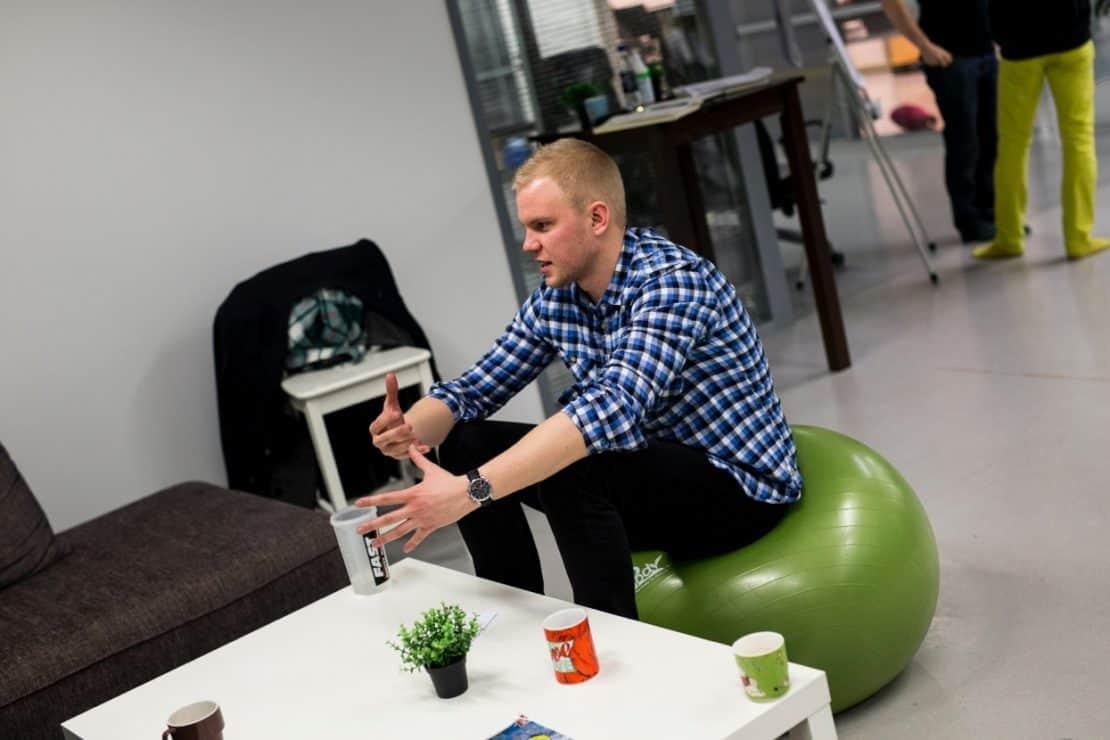10Feb2015
More Finns took a shot at becoming an entrepreneur according to a recent global report.
Roope Rämänen, a 28-year-founder of Finnchat, can’t think of a better career than being an entrepreneur. (Photo by: Hannu Rainamo)Held every year around the world, Global Entrepreneurship Monitor (GEM), released the results of its sixteenth survey on entrepreneurship on February 3, 2015. The 2014 GEM covered more than 206,000 individuals in 73 economies, representing 72.4% of the world’s population and 90% of the world’s GDP.
On average*, 7,8% of the population in European Union countries, aged 18 to 64, were starting or running new businesses.
Scandinavian countries headed to different directions as entrepreneurship in Finland was seen to grow slightly while Sweden and Norway saw a minor decline.
One of the key metrics representing entrepreneurial activity, Total early-stage Entrepreneurial Activity (TEA) includes individuals in the process of starting a venture and those running a new business less than 3 ½ years old.
In Finland the so called TEA -rates rose from 5,3% (2013) to 5,6% (2014) while Sweden went from 8,2% to 6,7% and Norway from 6,3% to 5,7%.
European Union economies did well by having a quite balanced level of early-stage entrepreneurial activity (TEA) rate (7.8%) and established business ownership rate (6.7%).
The downside was that European TEA rates were found to be the lowest (7.8% TEA in EU economies, 6.0% TEA in non-EU European economies) in the world.
”So thin a basis of early-stage entrepreneurial activity can jeopardize economic canvas in a crisis situation,” the GEM researchers write.
According to GEM, two out of three early stage entrepreneurs were motivated by improvement-driven opportunity in Finland and Denmark. Singapore, Norway, France and Japan stood out with around 70% of early-stage entrepreneurs motivated by improvement-driven opportunity.
The biggest region-related difference occurred in relation to the perception whether starting a new business is a desirable career choice—the highest rates were observed in the African economies, the lowest in the European Union economies. In Finland only 41,2% of people aged 18-64 saw starting a new business as a considerable career choice. The European Union average is 56,9%.
On the other hand, the study found Finns to hold successful entrepreneurs in high regard with 84,4% saying that entrepreneurs enjoy a high level of status and respect in the society. That is by far the highest rate of all European Union countries.
The lowest media attention towards entrepreneurship was found to take place in Europe.
I love the fact that growing and developing yourself is built into entrepreneurship.
Roope Rämänen is someone who the GEM researchers would refer to being in the middle of the “early-stage entrepreneurial activity”. Rämänen’s Finnish-based company, Finnchat is in its third operational year and now expanding to Germany. The 28-year-old founder is well on his way to moving into, what the GEM researchers consider, the ”established businesses” category.
The GEM Conceptual Framework includes the motivational aspect of starting businesses and has introduced a differentiation between necessity-driven and opportunity-driven motives for entrepreneurial activity. Rämänen fits right into the opportunity driven -category.
”I couldn’t think of any better career than being an entrepreneur. I love the fact that growing and developing yourself is built into entrepreneurship. As you succeed in things, the business grows, and it means you have to grow with it”, Rämänen explains.
Rämänen knows what he is talking about. Finnchat, a company providing online customer service for e-Commerce, has grown fast and now employs 60 people. According to GEM, less than half of all Europeans consider to have enough capabilities to start their own venture.
”I am a little worried if so few Europeans feel that they have the capabilities to become and succeed as an entrepreneur. One reason is that employers are increasingly searching for employees that have entrepreneurial capabilities and mindset, intrapreneurs,” Rämänen points out.
Raising the level of consciousness regarding entrepreneurship is something that Rämänen considers very important. ”Technology has changed the game of business and setting up a company is now easier and cheaper than ever. On the other hand, I guess that some might feel the pace of innovation overwhelming. They might rather work for someone who holds the responsibility of keeping the company competitive in an ever changing world,” Rämänen sums up.
*unweighted average
What is GEM: The Global Entrepreneurship Monitor (GEM) project is an annual assessment of the entrepreneurial activity, aspirations and attitudes of individuals across a wide range of countries. Initiated in 1999 as a partnership between London Business School and Babson College, the first study covered 10 countries; since then nearly 100 ‘National Teams’ from every corner of the globe have participated in the project, which continues to grow annually. The project has an estimated global budget of nearly USD $9 million. GEM is the largest ongoing study of entrepreneurial dynamics in the world.
Reference: GEM 2014 Global Report
Available at: http://gemconsortium.org/docs/download/3616

 by:
by: 
